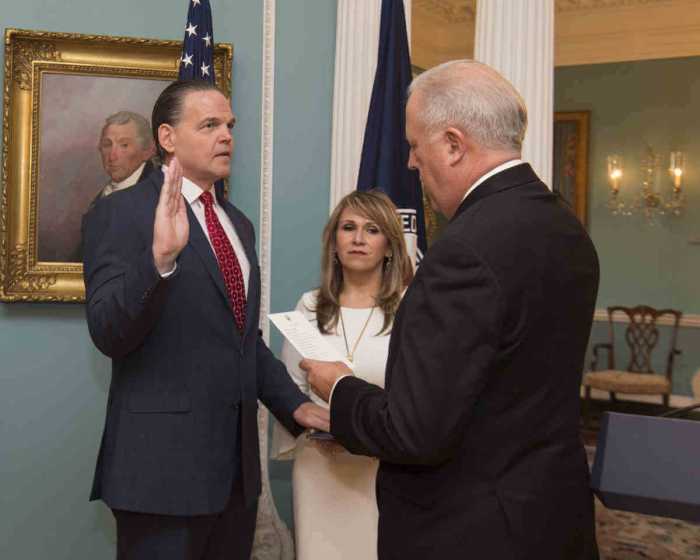Dana Alix Zzyym. | LAMBDALEGAL.ORG
BY ARTHUR S. LEONARD | “Just because” is not a good enough answer when the question is whether the State Department’s Passport Office was “arbitrary or capricious” in refusing to process a passport application from an intersex applicant who declined to check either M or F on the form. In a November 22 ruling, Colorado US District Judge Richard Brooke Jackson rejected the government’s motion to dismiss Dana Alix Zzyym’s challenge to the gender binary requirement on the application, though the judge reserved any ruling on the plaintiff’s constitutional claims. Instead, Jackson returned the matter to the State Department for “reconsideration.”
Zzyym identifies as an intersex person, born “with sex characteristics that do not fit typical binary notions of bodies designated ‘male’ or ‘female,’” according to an explanation in the complaint. To avoid using sex-based pronouns, the court refers to Zzyym throughout the opinion by the plaintiff’s first name, Dana, as Gay City News will do as well. In a press release about the court’s ruling, Lambda Legal, which represents Zzyym, mentions that Dana’s birth certificate says “unknown” in the space for sex, reflecting the ambiguous genitalia sometimes characteristic of intersex newborns.
Dana applied for a passport in 2014 and wrote the word “intersex” below the “sex” category on the application form, rather than checking either the box labeled male or labeled female. Dana identifies as neither and explained that in a separate letter requesting that an X be used as a marker in the sex field to conform to International Civil Aviation Organization standards for machine-readable travel documents. Some other countries have adopted the X for intersex people as well as transgender people who reject a gender binary choice.
Federal court finds State Department must justify its binary gender requirement
The Passport Office reacted like a typical hidebound bureaucracy and rejected the application immediately, without any evident policy consideration, merely explaining that “the Department of State currently requires the sex field on United States passports to be listed as ‘M’ or ‘F’” and noting that Dana submitted a driver’s license copy identifying Dana as “female.”
Dana appealed to the State Department and included sworn documents from physicians with the US Department of Veterans Affairs Medical Center in Wyoming, where Dana received treatment as a Navy veteran, verifying Dana’s sex as “intersex.” Dana’s appeal was rejected, and this lawsuit followed.
Dana made arguments on several grounds, first noting that the federal Administrative Procedure Act forbids government agencies from making decisions that are “arbitrary or capricious” in applying their statutory authority. Dana also alleged that the State Department exceeded the authority Congress delegated to it, since there is no statutory requirement that gender be listed on a passport.
Dana also alleged that the refusal to process the application was a violation of rights protected by the due process and equal protection obligations imposed on the federal government by the Fifth Amendment.
The State Department filed a motion seeking judgment on the Administrative Procedure Act claims and dismissal of the remaining ones. The court heard arguments on July 20.
Reserving his judgment on Dana’s constitutional claims, Judge Jackson focused on the Administrative Procedure Act issue, finding that the essence of that involves a requirement that the government have a reason for its policies.
“I find that the administrative record contains no evidence that the Department followed a rational decisionmaking process in deciding to implement its binary-only gender passport policy,” wrote Jackson, who noted that nothing in the State Department’s “collection of rules” on this question “contemplate[s] the existence of a gender other than male or female.” Faced with such a “new issue” as Dana raised, is it sensible to insist on identifying a person as having a sex that both the person and qualified medical authorities reject as inaccurate?
Jackson pointed out that the Department “simply justified the Department’s decision to deny Dana’s application by referring to” its policy. After litigation commenced, realizing it had to come up with some sort of justification, the State Department formulated a more elaborate explanation, but Jackson rejected it, finding that none of it “rationalizes the decisionmaking process behind this policy.” The policy, the judge concluded, was not concerned with accuracy, as such, but rather with being able to fit Dana’s information into its predetermined formal classifications.
The State Department’s argument that the computer chip embedded in identity documents only accommodates “M” or “F” as gender identification does not explain why changing that would “be worse than accommodating this presumably small population of intersex individuals,” Jackson wrote.
The government also asserted that it was necessary for passport information to “sync with law enforcement databases that exclusively use binary gender systems,” but it conceded that not every such database actually includes sex designations. Jackson also expressed puzzlement as to why then the Passport Office was willing to accept either a female designation for Dana as reflected on the driver’s license or a male designation if Dana provided a physician’s letter backing that up.
“How does the Department sync a transgender individual’s passport information with law enforcement records that might list that very same passport holder as the opposite sex,” he asked. “Without answers to these questions, I cannot conclude that the government rationally decided to formulate a binary-only gender policy.”
Jackson rejected as “pure speculation” the State Department’s argument that without a gender marker or with an X on the passport, Dana might encounter problems in traveling to other countries. “Isn’t that solely the problem of the passport holder who made the choice?,” the judge wrote. “The current record does not explain why these factors rationally support the policy in place.”
Jackson said it was possible the State Department could yet supple a rationale for its policy, but he rejected this first attempt. The next appropriate step, he concluded, was to send the matter back to the department for “reconsideration,” without dismissing Dana’s complaint or ruling on its constitutional claims.
Given the pending change of administration, a key question is whether the State Department will persist in resisting Dana’s request or liberalize its policy in line with the Obama administration’s decision several years ago to loosen its procedures for transgender people changing the sex designation on their passports. If the State Department hangs tough, this issue will be resolved in the Trump administration.
Jackson was appointed to the federal bench by President Barack Obama in 2010.




































